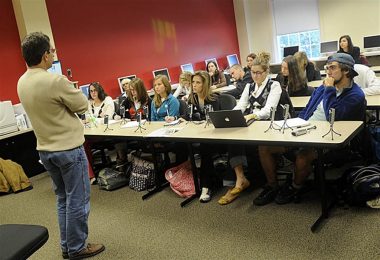Janna Anderson, associate professor in the School of Communications, has developed a new way of teaching the upper level writing class, Reporting for the Public Good. Instead of handing in typed up and printed out articles about campus events, students post their stories to the blogging site WordPress. According to Anderson, this emerging style of journalism will enable her students to become mobile journalists, or mojos.

Because Reporting for the Public Good is one of the most intensive writing courses for journalism majors, few of these students expected the class to take the form that it has.
“I have never been in a class where we’ve actually been required to blog,” junior Rebecca Wetherbee said. “While the Internet plays a huge part in my college education, until now the idea of blogs and blogging seemed unprofessional. I suppose because journalists are so dynamic, they’ve carved their own niche in the blogging community and transformed the medium into something that can be used by professionals and amateurs alike.”
Wetherbee added that her blog serves as an online portfolio of her writing, photographs and video. This will be helpful, she said, when it is time to apply for internships and jobs.
Each student in Anderson’s class carries a portable Flip Ultra video camera to capture events and create a more complete story. Anderson wrote a grant proposal to the Center for Teaching and Learning at Elon to order the 18 cameras. These cameras, priced at approximately $150 each, contain a USB connection that transfers the video straight to computer.
For their homework, students must cover at least three campus events per week. They post their corresponding articles, pictures and video to WordPress so that Anderson and the class may evaluate the work.
“Because we often have world-class events at Elon and amazing guest speakers and interesting local issues, students in Elon’s reporting courses now have the opportunity to compete on an equal basis with journalism professionals for a global audience,” Anderson said. “While they sometimes make silly mistakes or even embarrassing errors in fact, most of the time I consider their work to be the equivalent of, or even better than, most of the professional work out there. I expect to continue teaching the course this way.”
Anderson’s modification of Reporting for the Public Good acts as just one of the recent adjustments to the School of Communications curriculum. A list of links to these students’ WordPress sites may be found at http://lcowie.wordpress.com/.
By Lesley Cowie ’10 (Cowie is a student in Anderson’s Reporting for the Public Good course.)


